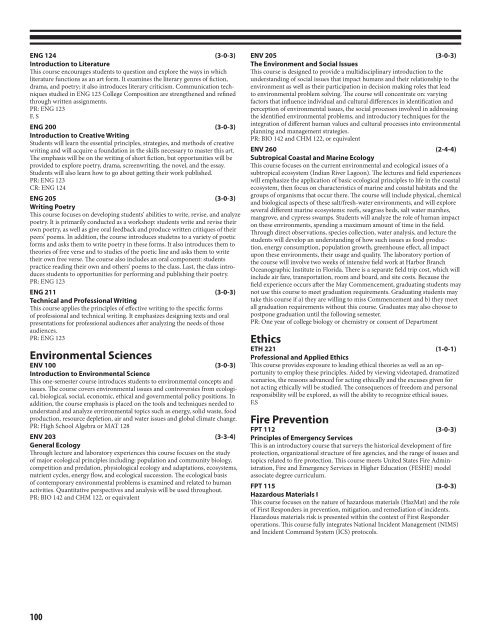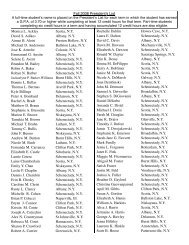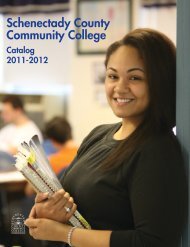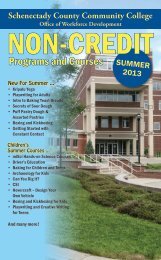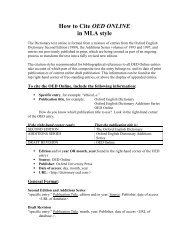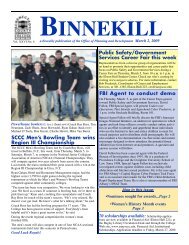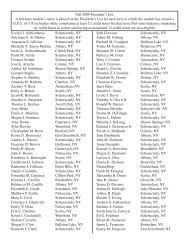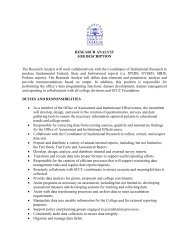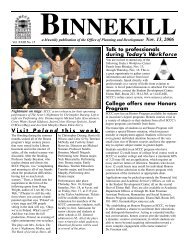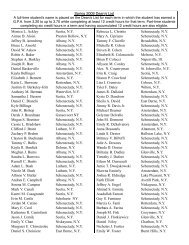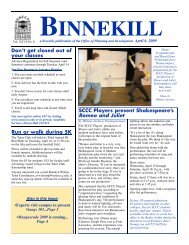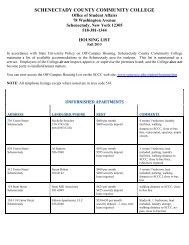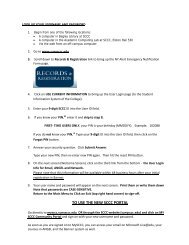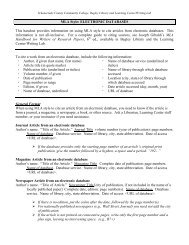ENG 124 (3-0-3)Introduction to LiteratureThis course encourages students to question and explore the ways in whichliterature functions as an art form. It examines the literary genres of fiction,drama, and poetry; it also introduces literary criticism. Communication techniquesstudied in ENG 123 <strong>College</strong> Composition are strengthened and refinedthrough written assignments.PR: ENG 123F, SENG 200 (3-0-3)Introduction to Creative WritingStudents will learn the essential principles, strategies, and methods of creativewriting and will acquire a foundation in the skills necessary to master this art.The emphasis will be on the writing of short fiction, but opportunities will beprovided to explore poetry, drama, screenwriting, the novel, and the essay.Students will also learn how to go about getting their work published.PR: ENG 123CR: ENG 124ENG 205 (3-0-3)Writing PoetryThis course focuses on developing students’ abilities to write, revise, and analyzepoetry. It is primarily conducted as a workshop: students write and revise theirown poetry, as well as give oral feedback and produce written critiques of theirpeers’ poems. In addition, the course introduces studetns to a variety of poeticforms and asks them to write poetry in these forms. It also introduces them totheories of free verse and to studies of the poetic line and asks them to writetheir own free verse. The course also includes an oral component: studentspractice reading their own and others’ poems to the class. Last, the class introducesstudents to opportunities for performing and publishing their poetry.PR: ENG 123ENG 211 (3-0-3)Technical and Professional WritingThis course applies the principles of effective writing to the specific formsof professional and technical writing. It emphasizes designing texts and oralpresentations for professional audiences after analyzing the needs of thoseaudiences.PR: ENG 123Environmental SciencesENV 100 (3-0-3)Introduction to Environmental ScienceThis one-semester course introduces students to environmental concepts andissues. The course covers environmental issues and controversies from ecological,biological, social, economic, ethical and governmental policy positions. Inaddition, the course emphasis is placed on the tools and techniques needed tounderstand and analyze environmental topics such as energy, solid waste, foodproduction, resource depletion, air and water issues and global climate change.PR: High School Algebra or MAT 128ENV 203 (3-3-4)General EcologyThrough lecture and laboratory experiences this course focuses on the studyof major ecological principles including: population and community biology,competition and predation, physiological ecology and adaptations, ecosystems,nutrient cycles, energy flow, and ecological succession. The ecological basisof contemporary environmental problems is examined and related to humanactivities. Quantitative perspectives and analysis will be used throughout.PR: BIO 142 and CHM 122, or equivalentENV 205 (3-0-3)The Environment and Social IssuesThis course is designed to provide a multidisciplinary introduction to theunderstanding of social issues that impact humans and their relationship to theenvironment as well as their participation in decision making roles that leadto environmental problem solving. The course will concentrate on: varyingfactors that influence individual and cultural differences in identification andperception of environmental issues, the social processes involved in addressingthe identified environmental problems, and introductory techniques for theintegration of different human values and cultural processes into environmentalplanning and management strategies.PR: BIO 142 and CHM 122, or equivalentENV 260 (2-4-4)Subtropical Coastal and Marine EcologyThis course focuses on the current environmental and ecological issues of asubtropical ecosystem (Indian River Lagoon). The lectures and field experienceswill emphasize the application of basic ecological principles to life in the coastalecosystem, then focus on characteristics of marine and coastal habitats and thegroups of organisms that occur there. The course will include physical, chemicaland biological aspects of these salt/fresh-water environments, and will exploreseveral different marine ecosystems: reefs, seagrass beds, salt water marshes,mangrove, and cypress swamps. Students will analyze the role of human impacton these environments, spending a maximum amount of time in the field.Through direct observations, species collection, water analysis, and lecture thestudents will develop an understanding of how such issues as food production,energy consumption, population growth, greenhouse effect, all impactupon these environments, their usage and quality. The laboratory portion ofthe course will involve two weeks of intensive field work at Harbor BranchOceanographic Institute in Florida. There is a separate field trip cost, which willinclude air fare, transportation, room and board, and site costs. Because thefield experience occurs after the May Commencement, graduating students maynot use this course to meet graduation requirements. Graduating students maytake this course if a) they are willing to miss Commencement and b) they meetall graduation requirements without this course. Graduates may also choose topostpone graduation until the following semester.PR: One year of college biology or chemistry or consent of DepartmentEthicsETH 221 (1-0-1)Professional and Applied EthicsThis course provides exposure to leading ethical theories as well as an opportunityto employ these principles. Aided by viewing videotaped, dramatizedscenarios, the reasons advanced for acting ethically and the excuses given fornot acting ethically will be studied. The consequences of freedom and personalresponsibility will be explored, as will the ability to recognize ethical issues.F,SFire PreventionFPT 112 (3-0-3)Principles of Emergency ServicesThis is an introductory course that surveys the historical development of fireprotection, organizational structure of fire agencies, and the range of issues andtopics related to fire protection. This course meets United States Fire Administration,Fire and Emergency Services in Higher Education (FESHE) modelassociate degree curriculum.FPT 115 (3-0-3)Hazardous Materials IThis course focuses on the nature of hazardous materials (HazMat) and the roleof First Responders in prevention, mitigation, and remediation of incidents.Hazardous materials risk is presented within the context of First Responderoperations. This course fully integrates National Incident Management (NIMS)and Incident Command System (ICS) protocols.100
FPT 116 (3-0-3)Hazardous Materials IIA continuation of Hazardous Materials I, course content stresses recognition ofpotentially hazardous situations, protocols of organized response, and regulatoryguidelines. Hazardous materials response is presented within the contextof First Responder operations. Specific attention is placed on the differentresponse protocols needed for remediation of weapons of mass destructionevents and other sources of HazMat situaions resulting from natural disasters,accidents, negligence and criminal activities. This course fully integratesNational Incident Management System (NIMS) and Incident Command System(ICS) protocols.PR: FPT 115FPT 120 (3-0-3)Building Construction for Fire ProtectionThis course provides the components of building construction that relate to fireand life safety. The focus of this course is on firefighter safety. The elements ofconstruction and design of structures are shown to be key factors when inspectingbuildings, pre-planning fire operations, and operating at emergencies.FPT 131 (3-0-3)Fire PreventionThis course provides fundamental information regarding the history of fireprevention, organizations and operation of a fire prevention bureau, use of firecodes, identification and correction of fire hazards, and the relationships of fireprevention with built-in fire protection systems, fire investigation, and fire andlife safety education. This course meets the United States Fire Administration,Fire and Emergency Services in Higher Education (FESHE) model associatedegree curriculum requirements.FPT 135 (3-0-3)Fire AdministrationThis course focuses on organization, personnel management distribution ofequipment, records and fire safety as they pertain to the fire service. Techniquesfor successful and efficient fire service operations are covered in this course.These topics include communications and fire alarm systems, legal aspects offire prevention, fire investigation and the recording and evaluation of fire datafor statistical purposes.FPT 137 (3-0-3)Fire Protection SystemsThis course provides information relating to the features of design and operationof fire alarm systems, water-based fire suppression systems, special hazardfire suppression systems, water supply for fire protection and portable fireextinguishers. This course meets the United States Fire Administration, Fireand Emergency Services in Higher Education (FESHE) model associate degreecurriculum requirements.FPT 213 (3-0-3)Hydraulics and Equipment IThis course focuses on incompressible fluids, principles of fluid statics and dynamics,fluid flow, pipe and hose or head losses, and pump systems operations.Sprinkler and standpipe systems and other special systems are covered.PR: MAT 128 or equivalentFPT 215 (3-0-3)Fire InvestigationThis course emphasizes the following subjects as they individually relate to fireinvestigations: elements of fire, combustion properties of fuel, pyrolysis, burnpatterns, ignition sources and explosions. A review of methods of interviewing,report writing, rules of evidence, forensic lab procedures, model arson law andNYS arson law is included.PR: May require New York State Police identification and/or registrationFPT 216 (3-0-3)Fire Protection Hydraulics and Water SupplyThis course provides a foundation of theoretical knowledge in order to understandthe principles of the use of water in fire protection and apply hydraulicprinciples to analyze and to solve water supply problems. This course meetsthe United States Fire Administration, Fire and Emergency Services in HigherEducation (FESHE) model associate degree curriculum requirements.PR: MAT 128FPT 219 (3-0-3)Fire Behavior and CombustionThis course explores the theories and fundamentals of how and why fires start,spread, and how they are controlled. This course meets the United States FireAdministration, Fire and Emergency Services in Higher Education (FESHE)model associate degree curriculum requirements.FPT 237 (3-0-3)Industrial Fire ProtectionProvides an introduction to the field of industrial fire protection and focuseson the topics of hazard control, special hazards and protection, fire protectionequipment, and systems and handling of emergencies.FPT 250 (1-8-3)Fire Protection InternshipThis course provides the fire protection technology student with the opportunityto participate in a planned, professional experience of observation, study,and field work within selected areas of the fire protection profession. Theseareas include but are not limited to: municipal fire departments, state or localfire protection agencies, industrial fire safety organizations, and installers of fireprotection systems. Textbook theory and classroom experience are enhancedas the student works in an appropriately supervised setting. The field study willspecifically incorporate fire protection, prevention, or suppression related assignments.All field work will be supplemented by regularly scheduled seminarswith the instructor.PR: FPT major with 30 completed credits, minimum overall GPAof 2.5, FPTcourse in area of internship, and permission of the department.First-Year Success SeminarFSS 120 (1-0-1)First-Year Success SeminarThe First Year Success Seminar is an orientation course designed to enhance thesuccess of first-year college students by introducing such topics as time management,learning styles, classroom expectations, support services and resources,major/career planning, stress management, and personal wellness.FrenchFRE 111 (3-0-3)Basic Conversational FrenchThis course introduces students to the idiomatic usage, vocabulary, and syntaxof contemporary colloquial French. Each lesson focuses special attention onspeaking and understanding spoken French in a situational context. The topicscovered include: reading a French menu, making plane reservations, makinga telephone call (local or overseas), changing foreign currency, obtainingdirections. A minimum of five hours of additional work in the language lab isrequired per term.FRE 121 (3-0-3)Elementary French IThis course provides an introduction to the French language through the developmentof listening, speaking, reading, and writing skills. It also examines thecultures of French- speaking people throughout the world. Classroom instructionis supplemented with activities in the language lab. Students are required tocomplete five documented hours of lab work outside of class.FRE 122 (3-0-3)Elementary French IIThe second half of the one-year sequence in Elementary French continues thedevelopment of listening, speaking, reading, and writing skills. The course continuesto provide an understanding of the civilization, culture and customs ofFrench-speaking people in multiple countries. Classroom instruction is supplementedwith activities in the language lab. Students are required to completefive documented hours of lab work outside of class.PR: FRE 121 or its equivalentFRE 222 (3-0-3)Intermediate French IThis course provides an extensive review of French grammar, and concentrateson helping students improve their vocabulary, conversational fluency andreading skills through the discussion of selected readings in French. Classroomdiscussions on the readings and French culture are held primarily in French. Aminimum of five hours of additional work in the language lab is required perterm.PR: FRE 122 or permission of the instructor101


